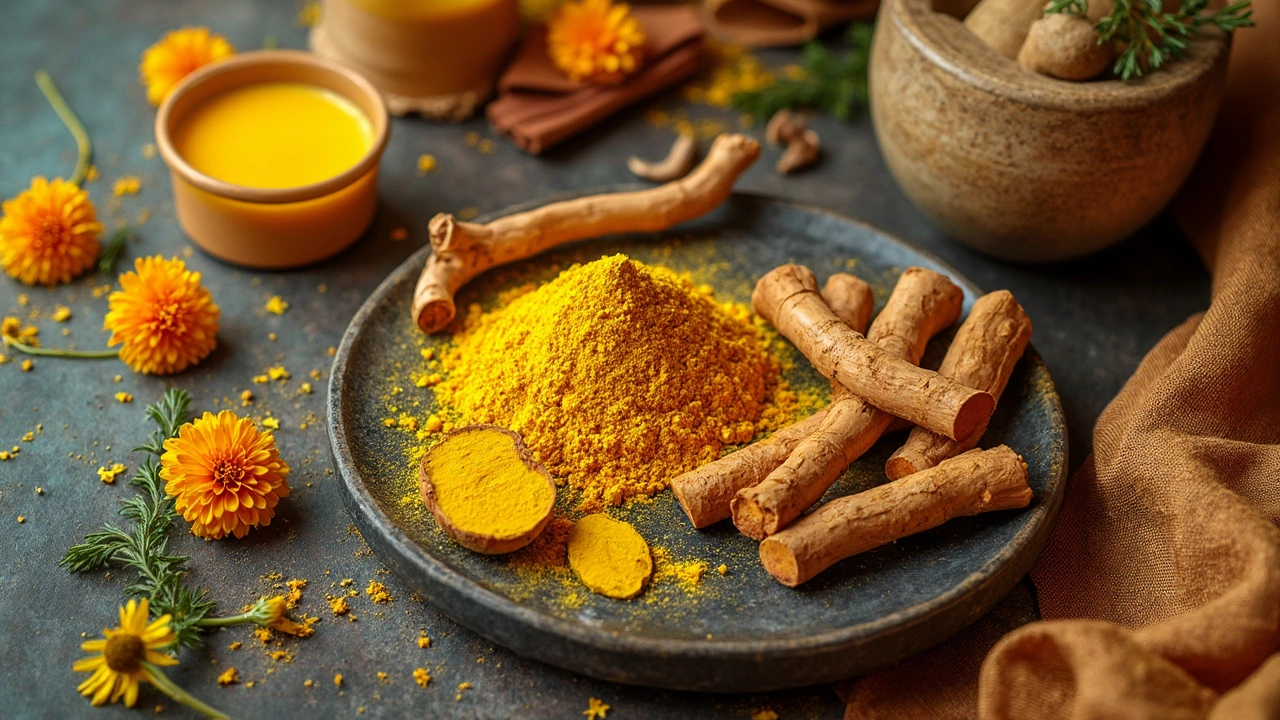If you walk into any health store or check the supplement aisle online, it’s easy to feel lost. Rows and rows of bottles—some with roots and leaves on the label, others with wild promises. Out of all the herbs out there, three just keep popping up: ashwagandha, turmeric, and ginseng. These aren’t just trendy picks; each one has real staying power—and a reason it’s stuck around for centuries.
People reach for herbal supplements for stress, joint aches, or a brain boost. But which ones are actually worth the hype (and your hard-earned cash)? I’ve figured out the top three by looking at what’s most talked about, backed by real research, and something you can actually find easily in shops. This tiny lineup stands out for helping you handle stress, feel less sore, and run a little sharper—no magic, just down-to-earth herbs that deliver.
- What Makes a Herbal Supplement ‘Mainstream’?
- Ashwagandha: The Stress-Busting Root
- Turmeric: The Golden Powerhouse
- Ginseng: From Ancient Tonic to Modern Must-Have
What Makes a Herbal Supplement ‘Mainstream’?
Ever wonder why some herbs get so much attention while others barely make it onto the shelf? A herbal supplement goes mainstream for a few straightforward reasons. First off, it’s about popularity—people actually use it and talk about it. Then there’s strong research behind it, so folks know it’s safe and effective for common problems like stress or inflammation. Easy access is just as key. If a supplement is too hard to find outside of a specialist shop, it’s just not going to catch on big time.
Here’s a quick breakdown of what pushes an herb into the top tier:
- Widespread Use: When everyone from athletes to busy parents is adding it to smoothies or teas, you know it’s mainstream.
- Backed by Studies: Real research (not just old stories) makes doctors and dietitians more likely to recommend it.
- Availability: You can spot it at health stores, big box shops, and even regular grocery aisles.
- Word-of-Mouth & Trends: Social media, your yoga class, and health blogs spread the word fast. If everyone’s buzzing about it, it becomes part of the culture.
Just to give you a real-world perspective:
"Herbal supplements like turmeric, ashwagandha, and ginseng have made their way into mainstream health routines not only because of tradition, but because science now supports their use for issues like joint pain and stress relief." — Dr. Neal Barnard, Physicians Committee for Responsible Medicine
Let’s check out how popular these main herbal supplements are in the U.S. right now:
| Herbal Supplement | Household Usage Rate (2024) |
|---|---|
| Ashwagandha | 28% |
| Turmeric | 41% |
| Ginseng | 19% |
If you’ve noticed these names coming up everywhere, it’s no fluke. Their rise is built on results, research, and word-of-mouth momentum, not just hype.
Ashwagandha: The Stress-Busting Root
When it comes to herbal supplements for stress, ashwagandha tops the charts almost every time. This root is famous in Ayurveda (India’s super-old medicinal system) for good reason. Ashwagandha, also called Withania somnifera, has been helping people chill out for centuries—and now modern studies back it up.
So, what does it actually do? Ashwagandha is best known for lowering cortisol, which is often called the “stress hormone.” High cortisol messes with your mood, sleep, even your belly fat. A small study from 2019 showed that people taking ashwagandha for eight weeks slashed their cortisol by up to 28% compared to the placebo group. Less stress equals better sleep and a calmer headspace.
It goes beyond just stress, though. Ashwagandha also gets attention for helping with anxiety, boosting focus, and even helping you recover faster from workouts. Some people find it helps their energy without making them jittery, which is rare for stress supplements.
- Usual dose is about 300–600 mg per day, often split into two doses. Look for extracts that mention “withanolides,” since that’s the active part.
- It’s usually best taken with food—this helps avoid mild side effects like stomach upset.
- You can get it in capsules, powder for shakes, or liquid drops. The powder has a bitter, earthy taste, so capsules are the easy route if that bothers you.
Watch out if you have thyroid problems or are on sedatives—ashwagandha can mess with those. It isn’t recommended during pregnancy either.
| Benefit | What Studies Show |
|---|---|
| Reduces cortisol | Up to 28% drop in 8 weeks (2019 clinical study) |
| Improves sleep | Noticed by 60% of participants in small 2020 survey |
| Aids recovery | Lower post-workout soreness, faster muscle recovery |
If you’re wired from work or just can’t seem to unwind, ashwagandha might be worth a try. Just give it a solid month—it works best when taken daily, not as a quick fix.

Turmeric: The Golden Powerhouse
If there’s one herb you’ve probably heard about a hundred times, it’s turmeric. Every health blog, Instagram influencer, and even your mom’s WhatsApp group seems to mention it. This deep yellow root has been a kitchen staple for ages, especially in Indian households. But it’s not just for curries—turmeric is famous for its hero ingredient: curcumin.
Here’s the deal: curcumin is an active compound in turmeric with serious science behind it. Studies have shown that 500–2,000 mg per day could help your body handle inflammation better. Think sore knees, stiff backs, or just that sluggish “I’m-getting-old” feeling. People also use turmeric for its antioxidant effects, which basically means it helps clean up the mess free radicals leave in your system and keeps your cells happier.
Check this out—according to a meta-analysis from 2023, folks taking turmeric supplements saw measurable drops in joint pain, especially if they had mild arthritis. And it doesn’t stop there. Some early studies are looking at how turmeric could support your memory and mood, though it’s not a magic fix for everyone.
If you’re thinking about adding turmeric to your routine, some quick tips:
- Always pair it with black pepper—piperine boosts absorption up to 20 times.
- You can find it in capsules, powders, even gummies now (just check the actual curcumin percentage).
- If you’re on blood thinners, talk to your doctor first. Turmeric can interact with those.
For those who love numbers, here’s a look at turmeric’s benefits based on recent research:
| Benefit | Study Year | Reported Effect |
|---|---|---|
| Reduces joint pain | 2023 | Up to 30% decrease in self-reported pain |
| Boosts antioxidant activity | 2022 | About 25% increase in antioxidant levels |
| Supports mood | 2021 | Small but notable drop in depression scores |
Turmeric does a lot for one little root. But just throwing powder on your food isn’t the same as getting a solid supplement. Look for products that mention standardized curcumin and check if they contain black pepper on the label. That way, you actually get what the studies are talking about—not just tinted rice.
Ginseng: From Ancient Tonic to Modern Must-Have
Ginseng is basically a staple in the world of herbal supplements. This root—especially the Asian and American types—has been a go-to in traditional medicine for ages. It’s not just hype from old stories: ginseng is loaded with compounds called ginsenosides, which are thought to give it real benefits for energy, mental clarity, and the immune system.
Let’s talk about energy. Ginseng isn’t like caffeine; it doesn’t give you the jitters. Instead, people often say it helps them push through the afternoon slump or recover faster after a tough week. There’s actually research to back this up—a 2021 study of office workers found those taking ginseng every day felt less tired and were less likely to get sick during stressful months.
Here’s a quick breakdown of what ginseng is best known for:
- Boosting mental focus and memory
- Helping fight tiredness without crashes
- Supporting a stronger immune response
Now, don’t go overboard. The usual dose is about 200–400mg a day for extracts, but always check what’s on the bottle or ask your doctor, since strengths vary a lot between brands. Also, ginseng can mess with some meds—especially blood thinners—so check first if you’ve got health stuff going on.
Money question: can it really help? It’s not a miracle fix, but for folks dealing with low energy or brain fog, a few weeks on ginseng has helped some folks feel more like themselves. That said, big promises should make you pause—some claims (like dramatic weight loss) just aren’t backed by science.
| Type | Main Benefit | Common Dose |
|---|---|---|
| Asian Ginseng | Energy, focus | 200–400mg/day |
| American Ginseng | Stress & immune support | 200–400mg/day |
Want to try it? Here’s a tip: look for “standardized extracts” with ginsenoside content listed, so you actually know what you’re getting. And quality matters—a cheap bottle off the internet may not have much real ginseng in it. If you stick to trusted brands, ginseng could be a handy add-on to your daily routine.

 Life After Heart Surgery: Navigating Recovery and Embracing Change
Life After Heart Surgery: Navigating Recovery and Embracing Change
 Should I Force My Knee to Bend After Knee Replacement?
Should I Force My Knee to Bend After Knee Replacement?
 Fast 20‑Pound Weight Loss After 50: Proven Steps and Expert Tips
Fast 20‑Pound Weight Loss After 50: Proven Steps and Expert Tips
 Understanding How Quickly Herbal Supplements Take Effect in Your Body
Understanding How Quickly Herbal Supplements Take Effect in Your Body
 What Is the Most Common Orthopedic Emergency? A Deep Dive into Fractures
What Is the Most Common Orthopedic Emergency? A Deep Dive into Fractures